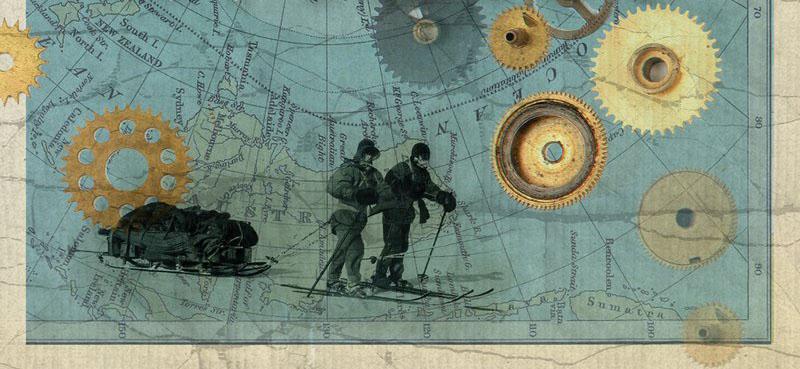
Shortlisted!

It’s award season! AND WE HAVE UPDATES!
The Minds of Winter by Ed O’Loughlin was longlisted for the 2017 Scotiabank Giller Prize… well, it’s since been shortlisted! It’s the first time Ed’s made the Giller shortlist and we couldn’t be happier. (We’re also thrilled to see our indie publisher friends at Invisible Publishing make the shortlist for I Am A Truck by Michelle Winters.)
The Governor General’s shortlists were also recently announced, and Daniel Grenier and Pablo Strauss are nominated for the #GGBooks award in the Translation category for The Longest Year! Spanning three centuries and set against the backdrop of the Appalachians, from Quebec to Tennessee, The Longest Year is a magical and poignant story about family history, fateful dates, fragile destinies, and lives brutally ended and mysteriously extended.
We’re crossing our fingers for The Break by Katherena Vermette! It’s shortlisted for CODE’s 2017 Burt Award for First Nations, Inuit, and Métis Literature, which was won by The Outside Circle last year. The Break, a stunning debut novel by multi-award–winning poet Katherena Vermette about a multigenerational indigenous family dealing with the fallout of a shocking crime, won the Amazon.ca First Novel Award and McNally Robinson Book of the Year Award earlier this year — here’s hoping for a third win!
Wait, let’s make that a fourth win because… The Break was just chosen by readers from over 100 Ontario libraries as the 2017 Forest of Reading Evergreen Award Winner! Congratulations, Katherena! You can read the full press release here.
 It begins with a chance encounter at the top of the world.
It begins with a chance encounter at the top of the world.
Fay Morgan and Nelson Nilsson have each arrived in Inuvik, Canada, about 120 miles north of the Arctic Circle. Both are in search of answers about a family member: Nelson for his estranged older brother, and Fay for her vanished grandfather. Driving Fay into town from the airport on a freezing January night, Nelson reveals a folder left behind by his brother. An image catches Fay’s eye: a clock she has seen before. Soon Fay and Nelson realize that their relatives have an extraordinary and historic connection — a secret share in one of the greatest unsolved mysteries of polar expedition. This is the riddle of the “Arnold 294” chronometer, which reappeared in Britain more than a hundred years after it was lost in the Arctic with the ships and men of Sir John Franklin’s Northwest Passage expedition. The secret history of this elusive timepiece, Fay and Nelson will discover, ties them and their families to a journey that echoes across two centuries.
In a feat of extraordinary scope and ambition, Ed O’Loughlin moves between a frozen present and an ever thawing past. Minds of Winter is a novel about ice and time and their ability to preserve or destroy, of mortality and loss and our dreams of transcending them.
 In 1966, twelve-year-old Chanie Wenjack froze to death on the railway tracks after running away from residential school. An inquest was called and four recommendations were made to prevent another tragedy. None of those recommendations were applied.
In 1966, twelve-year-old Chanie Wenjack froze to death on the railway tracks after running away from residential school. An inquest was called and four recommendations were made to prevent another tragedy. None of those recommendations were applied.
More than a quarter of a century later, from 2000 to 2011, seven Indigenous high school students died in Thunder Bay, Ontario. The seven were hundreds of miles away from their families, forced to leave home and live in a foreign and unwelcoming city. Five were found dead in the rivers surrounding Lake Superior, below a sacred Indigenous site. Jordan Wabasse, a gentle boy and star hockey player, disappeared into the minus twenty degrees Celsius night. The body of celebrated artist Norval Morrisseau’s grandson, Kyle, was pulled from a river, as was Curran Strang’s. Robyn Harper died in her boarding-house hallway and Paul Panacheese inexplicably collapsed on his kitchen floor. Reggie Bushie’s death finally prompted an inquest, seven years after the discovery of Jethro Anderson, the first boy whose body was found in the water.
Using a sweeping narrative focusing on the lives of the students, award-winning investigative journalist Tanya Talaga delves into the history of this small northern city that has come to manifest Canada’s long struggle with human rights violations against Indigenous communities.
When Stella, a young Métis mother, looks out her window one evening and spots someone in trouble on the Break — a barren field on an isolated strip of land outside her house — she calls the police to alert them to a possible crime.
In a series of shifting narratives, people who are connected, both directly and indirectly, with the victim — police, family, and friends — tell their personal stories leading up to that fateful night. Lou, a social worker, grapples with the departure of her live-in boyfriend. Cheryl, an artist, mourns the premature death of her sister Rain. Paulina, a single mother, struggles to trust her new partner. Phoenix, a homeless teenager, is released from a youth detention centre. Officer Scott, a Métis policeman, feels caught between two worlds as he patrols the city. Through their various perspectives a larger, more comprehensive story about lives of the residents in Winnipeg’s North End is exposed.
A powerful intergenerational family saga, The Break showcases Vermette’s abundant writing talent and positions her as an exciting new voice in Canadian literature.

